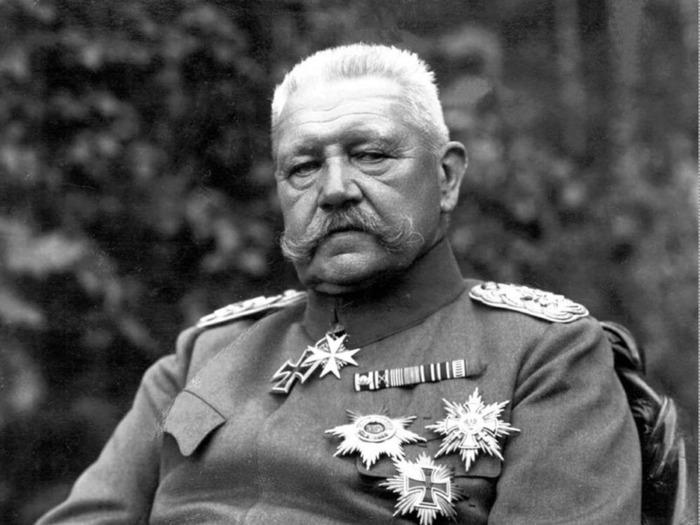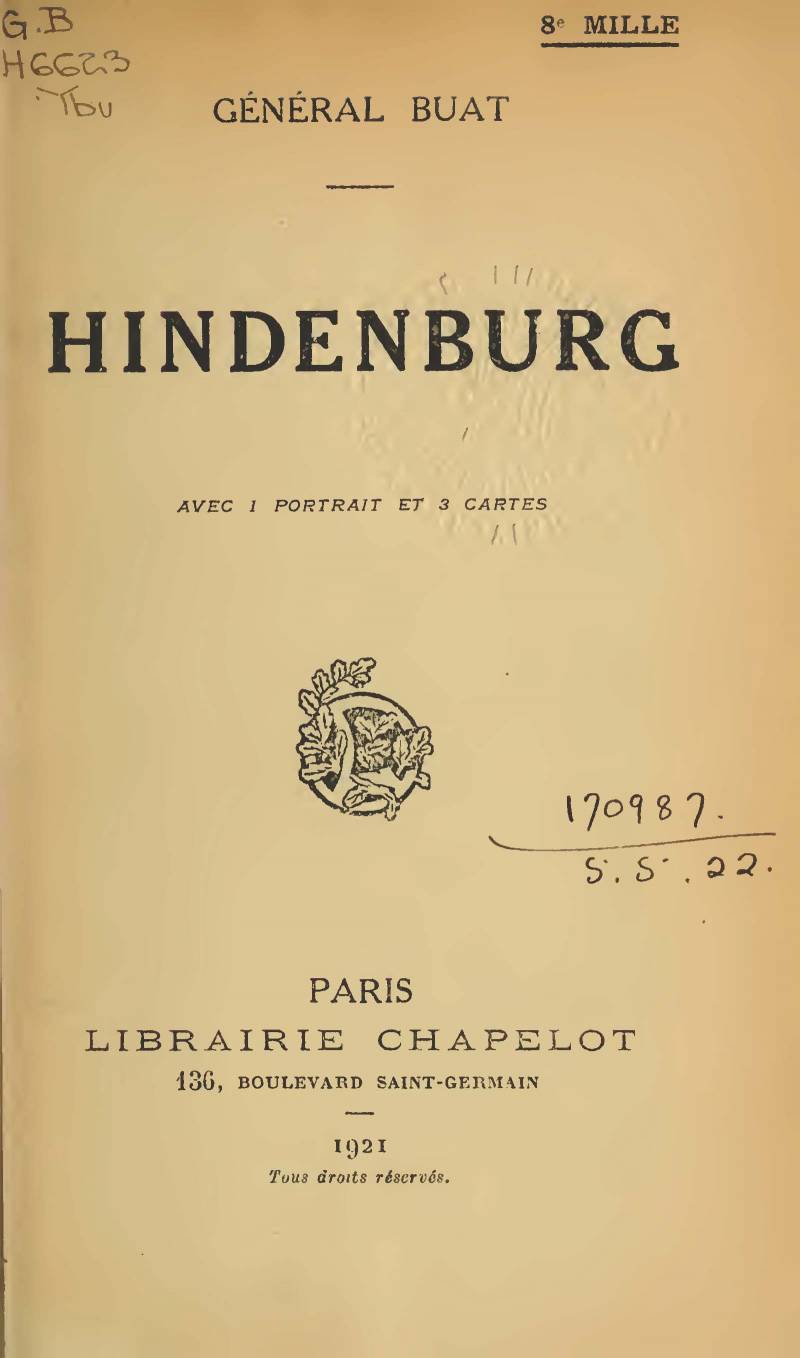Hindenburg in French
General Buat. Hindenburg. Paris, 1921. (General Bua. Hindenburg. Paris, 1921) - this is the name of the reviewed work of one of the largest French military specialists.
A strategist at war has to display his art, relying on the very unreliable data of the evolving and ever-changing operational environment. It can be compared with the player who opens his cards, not knowing which card is in the hands of his opponent. The strategist has to anticipate the course of his opponent - and without being sure that the chances of success are really realized. According to the apt French expression, a professional strategist operates in a dark office, which is penetrated only by weak light rays - from the enemy.
That is why these “dark room strategists” eagerly waited and sought to find out how their opponent is implementing this or that operational-strategic maneuver.
The study of these strategists and their work immediately after the end of the First World War was taken up by General Bue, who studied the memoirs of the “sphinxes” of his time - P. von Hindenburg and E. von Ludendorff.
Hindenburg von Benkendorf und von Hindenburg Paul (1847-1934) - at the beginning of World War - the infantry general, at the end - the field marshal general. Starting his military career as commander of the 8 army, in September 1914 he accepted the 9 army, from October 1914 he headed the German Eastern Front (in August 1915 - July 1916 - Army Group of the Hindenburg, in July - August 1916, the Hindenburg Front). Being a supporter of the Schlieffen's “Strategy of Smash”, together with E. Ludendorff in the summer - autumn of 1915 in the Baltic States (in peak of the operational planning of the High Command), he carried out his strategy. From August 1916, Mr. P. Hindenburg becomes Chief of the Field General Staff. During this period he was the idol of the German people, the most popular general of the world war.

General Bue in his work concludes that, despite all the "PR" in the years of the First World War, P. Hindenburg as a commander does not bear any comparison with either Caesar, or Friedrich, or Napoleon. The author writes that the “dizzying” successes of P. Hindenburg, which created him the admiration of the army and even the entire German nation, were gained “by them over the Russians, i.e., over such an adversary whose naivety allowed him to know not only the danger that threatened him, but even details of plans and all orders. ” Thus, Bua hints at the fact that the Germans intercepted Russian radiograms - a circumstance that left more than a significant imprint on the operational success of P. Hindenburg and E. Ludendorff. Despite the fact that the author of the reviewed work described the operational management of Russian armies as “naive”, it, despite all its mistakes, more than once crushed the plans of P. Hindenburg (September - October 1914) and put the German commander more than once in critical position (1915-th year).
The conclusion of the authoritative Bua not only significantly reduces the "brilliance of glory" of P. Hindenburg, but also makes it possible to understand why on the Western Front the winning strategy under Tannenberg was more ephemeral and less guaranteed - and led Germany to the fatal end of world war.
Did P. Hindenburg bring something new to the field of strategic art - after all, he also gained "success" on the Eastern Front? To this, the French, through the lips of Büa, give a negative answer, noting that it only reproduced the doctrine elaborated by the Great General Headquarters, which consisted in an offensive covering one or both flanks of the enemy. On the Western Front, "where there were no flanks," where a solid front was formed, this notorious doctrine "had no value."
From August 1916-th to 1918-th Mr. P. Hindenburg had enough time to think through a plan for future operational and strategic actions. As is known, in the 1918 campaign, he decides to maneuver, by pressing the English front, cutting him off from the French and thus ending the strongest at that time, as the author notes, “our ally”. The first attempt (March - April 1918) failed due to French help, and then P. Hindenburg decided to break through the French front in the Paris direction. Bua believes that a better solution would be to send a blow to the Upper Alsace.
The result of the failure of 15 in August 1918 was the departure of the Germans in the position of Siegfried - Kyundin - Brunhild. This withdrawal did not save, according to Bue, the German army, but he delayed its inevitable death.
As for the final idea of creating a “universal militia” in October of 1918, which matured under the guidance of P. Hindenburg and E. Ludendorff “to save the honor” of the German army, it did not find a response in Germany. Duumvirat Hindenburg-Ludendorff overlooked that the German people had already given millions of sons to the Great General Staff, and the nation refused to give additional human resources into the hands of those who had so improperly disposed of them.
The author emphasizes that he does not find any elements of “genius” in the Hindenburg-Ludendorff strategy. Both of them, differing from each other in their character traits, were typical representatives of the Great General Staff.
Describing the portrait of his hero, the author notes that the German monarch P. Hindenburg was full of reverence, respect and admiration. According to the Hindenburg, the German army owes all its successes exclusively to the Hohenzollern - especially to their last representative. After all, Wilhelm II, remaining faithful to the family traditions of the dynasty, worked steadily on the development of his army - "the best teacher of the German people."
Needless to say, Bua exclaims that the people, driven and brought up in the spirit of such a concept, are involved in severe trials, and its resources will sooner or later be sacrificed to the “chimera of several proud”.
This, apparently, the professional strategists of Germany did not understand.
And, according to the author, self-deceived by the victories won from 1813 to 1871, the Prussian military leaders came to the firm conviction that any military-political undertaking of their monarch could not end with anything new and brilliant victories.
Bua emphasizes the arrogance with which the first Quartermaster General sought the resignation of two chancellors, who either disagreed with him or did not have time to listen to his dictatorial habits.
The author notes that P. Hindenburg did not even notice a hint of the moral aspect of military operations: the German command unceremoniously violated the neutrality of Belgium, used poisonous substances, led the submarine war, encouraged destruction and even systematic devastation of the occupied territories. Neither in the memoirs of P. Hindenburg, nor in the memoirs of E. Ludendorff you will find even a shadow of condemnation of this policy of robbery and non-standard methods of warfare.
If E. Ludendorff blames the revolution that destroyed the pride and power of the German Empire, calling on the German people to remain faithful to their ideals, P. Hindenburg appeals to the youth of his country to land again on the rock on which our power created the future of our homeland: the German Empire. "
But in 1918, the German people no longer believed in these dreams. And P. Hindenburg stayed in stories as one of the most iconic and controversial figures of the highest generals of the German army during the First World War.
Cover labor Bua. From the author's library.

Information